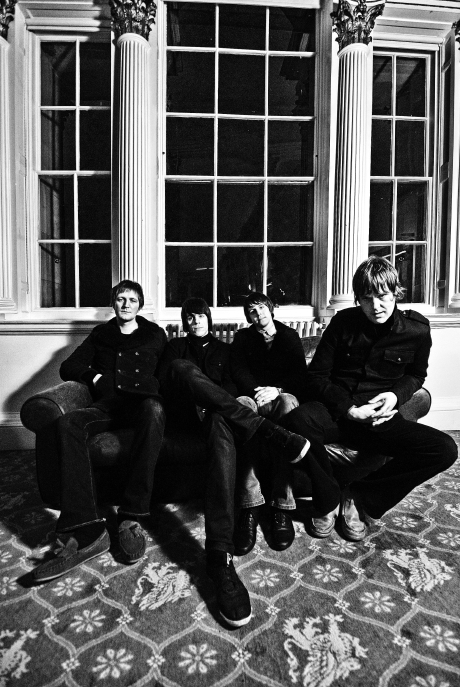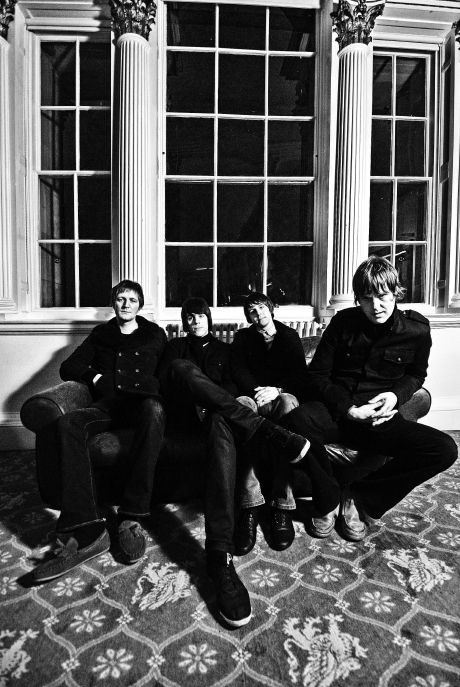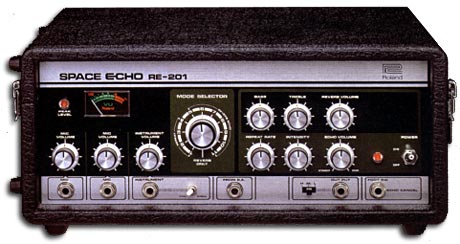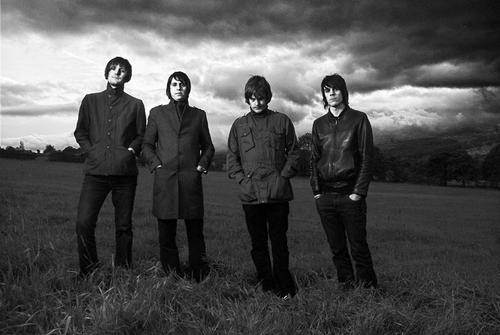

Exit Calm are the best British indie band we've heard in years - that's why we've awarded their self titled debut five stars in our latest issue (329).
Rob Marshall's guitar playing is a huge part of what makes the Barnsley four-piece so special - this young player masterfully orchestrates waves of reverb-flooded delay in a sound that redefines the term epic.
Let's find our more about the band and Rob's rig…
We heard your first single We're On Our Own back in 2008, the album's been a long time coming…
Rob Marshall: "Tell me about it! [laughs]"
Has road-testing the songs for this amount of time made that wait worth it for you though?
"Definitely, because we wanted this to sound like a live record - that's what we wanted to get across. The way we approached it was completely from that place. We wanted to try and capture something that was organic, rather than cheat people with what they expect from us. So it's definitely helped."
Want all the hottest music and gear news, reviews, deals, features and more, direct to your inbox? Sign up here.
So did you set up in the studio as a band in a similar way as you do onstage?
"We were pretty much set up as we are live. It's every producer's nightmare isn't it? To turn round and say to them that we literally want to try and record everything live. We tried to separate it as much as we could but for pretty much every song we did it was start and finish and that was it.
"From a guitar point of view there was a couple of things, say for example Forgiveness which was written pretty late on. I improvised through it and after about four or five takes I went in and said, I like that bit on the verse, chop that bit… but essentially the majority of the music was playing live. We felt like we had something that had a lot of energy.
"The main thing our producer, Paddy Byrne brought to the recording session was his spirit - he brought sanity too because it was pretty mental. We were doing ten or 11 hour days for three weeks. There were times when it was just fucking ridiculous but he was kind of like the strength - he's let us go off where we needed to but then pull us in at the end of it. To be honest, I don't know if we'd have come out with a record if it wasn't for him. Then it went off to Ulrich's [Schnauss, mixer], who's a creator in his own right."
There are staple songs from the live set such as Higher Learning that didn't make the album - was it hard making the decision?
"We recorded everything that we played live. We didn't go in knowing what the first and last song would be. We thought, We'll see how it sits together once we'd recorded everything. It it's weird like that because the songs that you think are going to come out sounding amazing because they just play themselves so easily, don't come out as well on the recordings. And then the ones we weren't sure about ended up sounding great.
"And the only one we didn't re-record was Higher Learning. We were quite happy with the original version and it's become its own thing in a way. I hate it when bands try and reproduce something they've already done. So we just left that one."
Is the writing process in the band equal contribution - do ideas tend to come from jams between the four of you?
"We all write our own parts but where the ideas come from varies. There are times when a lot of it comes from the guitar and then we'll jam around the idea. But there's no dictatorship - everyone puts a part in and then it leads naturally to where it's going.
"For example, if it comes from the bass then it's generally a looped bassline, we'll jam round it and it'll take on its own life. We never try and force anything, we let an idea find its natural feet first and then when we get stuck we'll argue over a couple of chords for ten days or something!"
That's an interesting part of your sound - there's a looseness to it that's come from jamming but the songs grow and shift in a way that shows a lot of care has gone into it…
"Completely - there's definitely a jam element to it but after a while you have to cut it down and make a song from it, otherwise it'll be boring… it's not everyone's cup of tea.
"The thing about Nicky [Smith, vocals] as well, he's got an amazing ability to put a melody over anything really, something that's really catchy straight away. That helps us become more focused on the song, as soon as Nicky puts something into it, it takes on that form."
The guitar playing on the album often has an instinctive feel too - do you come up with a lot of ideas of the spot when jamming with the band?
"If I've got my gear I'll try and come up with something based on the sound but if we're improvising, I'm not afraid to make mistakes. A lot of times I'll do something that's weird and end up loving it. So many guitarists are quite timid about what they should play and what they shouldn't but they should try and not overthink it, let it happen naturally and organically. Whether it's the right note or not."
It sounds like the album has two halves - the first being more optimistic, the second darker. You're fans of vinyl and have released your music exclusively that way with the Higher Learning single in the past. Was the idea of two sides on your mind with this album?
"It wasn't written like that intentionally but it was definitely put together with that in mind later. We wanted that old school, two-sided vinyl thing. "For me the first half ends after Don't Look Down and the second starts with Forgiveness. Hence the interludes and loops - Don't Look Down ends with a kind of interlude which I thought was a nice way to end the first half of the album. In terms of darkness and light, yes the second half is a lot darker."
The last song, Serenity, is quite different, it's the one song that sounds like it was written on an acoustic…
"It was something Nicky and I had done together that we hadn't intended for the album. It happened in the third week at the studio. We hit a day when nothing was really happening and whenever things went a bit messy Paddy would say, Oh fuck it lets get pissed! Every time we hit a bit of a stumbling block he'd come in with a crate of Red Stripe!
"In a rare exception when we took the afternoon off and didn't need to do anything else - we'd got quite a lot done - and basically he'd come in a couple of days earlier with this acoustic and me and Nicky started messing around with an idea in the room.
"We just started recording it. It was the first take - we recorded it three times but we went with the first one. Which is great; we were just sat there together. Then I played a lot of textural things on top of it, improvised a lot of things.
"It was a nice moment and I think it's quite unexpected on the album - I don't think people would expect it to end on such a note. It shows another side, especially when you compare it to [opener] You've got It All Wrong because it's really different. It ends on quite an optimistic note."
"So many guitarists are quite timid about what they should play and what they shouldn't but they should try and not overthink it, let it happen naturally and organically."
We have to ask about your guitar sound - immense would be an understatement. I'd imagine you have people taking notes of your pedalboard at gigs, are you secretive about what the exact set-up is with your rig?
"I'm not really that secretive, no. I've kind of stumbled my way through equipment. I've never really been that geekafied - I've found things that I like. I think I've got a good ability to take a pedal, and whether it's good or bad, I find something that's great in it.
"People ask, How do you get such a big sound? Well I think Link Wray had a big sound - and that was just a guitar plugged into an amp turned up loud and left open. It's a lot more in the personality of the player than the equipment that they use.
"I love John Martyn - he's one of my favourite guitar players - and he started off with quite s traditional picking style. Then he got an Echoplex and by the time he got to Inside Out, just adding that one thing, changed his playing.
"It wasn't just the style - it became a world of escapism. I love that. But I think it's more the man than the pedals. Between the guitar and amp you can add bits and pieces to fuck with the sound but it's the approach of the player."

But of course we have to ask, what effects are you using?
"Live I use a Marshall head, then I basically go into an old Roland Space Echo, the actual analogue tape one. I've got a Line 6 [DL-4] that I use but I'm not really precious about it, although it's become part of my gear that I always use.
"I just take a line out of the head into another reverb unit so then I've always got this backwash of sound. So I can use a drive signal through the main amp and balance it according to how much wash I want. It's always got this cushion of reverb behind it.
"In the studio I mixed it around a bit - I took advantage of some of the gear they had. They had a Music Man head lying around, an old Selmer and I used that for some of the tracks.
"I've become quite obsessed with sound at times but I just want to try and get that balance between and digital sound and analogue which is really difficult. You can lose your mind trying to get it!"
Do you have to change delay settings mid song sometimes?
"Yes. I even EQ every song slightly different - to the annoyance of everyone else because most people like blasting from one song to another. I'm quite fast at it but there's a little pause between songs and I'm twiddling knobs and changing everything."
And you work from memory?
"Yes it's the best way I think and I tweak things as we're playing. Because every room we play is different anyway - you have to play to the room you're in. Sometimes it'll be really quite shrill and bright sounding… I feel like I'm sounding like a geek here!"
No, we like that! But I was going to ask you about feedback, because Heart And Minds for example, makes very effective use of it. That must be a changing challenge to work within in different venues…
"Sometimes in a soundcheck we'll go into that and it's not happening - the notes I want just aren't coming out. But you just find these sweet spots in the room, you might have to use a lot more middle so the note pops out. That's the best thing about the soundcheck and sometimes you'll just plug in and say, fucking hell this sounds incredible! Other times you're thinking this is going to be a tough one."
You said earlier about focusing on capturing your live dynamic, did that mean you were very strict on yourself when it came to adding overdubs?
"I wanted the record to work on two levels - if you played it on a stereo I wanted it to work in the way you would hear us live but if people listen on headphones there would also be lots of layers, textures and depth to the mix. People would be able to get lost in it and hear extra things.
"It's escapism at the end of the day, I love it myself when I listen to a record and it allows you to go off and daydream then something will pull you back in. I wanted to capture that and have that depth to it. But I didn't want to do it in the classic way - overdubbing straight guitar parts. I wanted to get down essentially what I do live then basically do textural and more sonic things to try and bring out certain parts."
Do you use an overdrive pedal?
"Yes I've got an original BOSS OD-1 and Blackstar gave me a Dual Overdrive. I didn't use it much on the record to be honest but I've started using it live and I think it's pretty good. It adds a little bit of warmth to the general sound and gives me a little bit of a boost if I need it."
What's your main guitar?
"Believe it or not it's a Yamaha guitar - a Pacifica. It's weird but I've always taken more interest in the amp side of things than I have with the guitar. I've had it for so long now, I've just got used to how it sounds - for all its faults. It doesn't look visually very good but I've got so used to the sound, I can't really get rid of it!
"I've tried playing loads of different guitars and I've had a few lent to me but I'm still searching, I'd love to find the perfect guitar but I haven't really got it yet. Well, maybe I have but it doesn't look right! No, it's not that bad looking but I think with the music, people expect me to be holding the obvious."
Well we're big fans of the Pacifica here. But have you made any upgrades to it over the years?
"I've had the wiring changed with one of the pickups by a guy from Richmond. He's split the coils on one of them. It's not a heavily modded guitar - just a few little tweaks here and there. But I think its age has changed the sound of it - it's weird and people have told me that before.
"It's got better in sound as it's gone on but got harder to play. The neck's becoming worse and worse so I think its final days aren't too far head. I better find something else pretty quick!"
You're playing a Jaguar in the video for Hearts & Minds - is it yours?
"I borrowed it from Tom [Clarke] from the Enemy, he brought it down to the studio. It's a great-looking guitar."

You recorded the album in Hoxton, for some reason I was surprised you chose to go there…
"Well originally we were going to do the album in some quant village somewhere, and we went down to the studio and recorded and there was nothing there at all. It was lovely and the idea of it was great but despite the fact it was really quiet, I think we would have got less done.
"Even though Hoxton is a bit of a trendy shithole, because we were in London we seemed to lock ourselves away and really went at it. If we'd been in the countryside we'd have probably got less done and sat around getting fat."
And you did a gig there too?
"At the Bar And Kitchen - it was amazing. It was a few months back but it pretty much turned out which was incredible. It felt like the first time we'd come to London and people were there waiting. A lot of anticipation and without sounding like a hippy, there was static in the air.
"It was like there were people there who had read so much about us and they waiting to see if it was right or wrong. Luckily we were on fire."
Mani is an Exit Calm fan, Nick McCabe too - that must be a bit surreal for you…
"Definitely, the whole Verve [comparison] thing is weird because we get to a point where we're overshadowed by it. At the end of the day we're all Verve fans but not to the extent that some people would like to believe.
"Having said that I respect Nick McCabe and having got to know him, I value his friendship but I'm doing my own thing. He knows that as well and anyone who spent time with me would know I'm very much my own person. I'm not a copycat. It's not like we're looking back for acceptance, It's just trying to take a collection of subtle influences before us and put our own stamp on things."
"I hope that's what people get from us - that they believe us, that we're not bullshitters."
Puressence are a band you've supported - they're unsung heroes when it comes to the last 20 years of northern bands but do you feel connections with them? If not direct sound comparisons, more outlook and the feeling of your music…
"I think it's spirit- there's definitely a euphoric feeling in some of the songs we do and there's definitely that with Puressence. It's like an urgency to get something across and you can see that when they play live - specially the singer [James Mudriczki].
"And I believe him as well. I hope that's what people get from us - that they believe us, that we're not bullshitters."
What other bands have you toured with that left an impression?
"We toured with [Echo And] The Bunnymen which was incredible - quite a highlight for us because we're all fans and we got to play some amazing venues with them. We did some dates with Modest Mouse and the Soulsavers too - who feature Mark Lanegan. Great gigs, but the best tour we've done is our own.
"The dates with Echo and The Bunnymen were great because we got to play to so many people, and it's a hell of a buzz walking out to that many people. Converting them as well. But when you turn up to a venue, it's pretty rammed and they're all there to see you, it's quite humbling really. Well it is at the moment because we're not used to it really."
And you've already got a devoted fanbase…
"Yes from all over the place - it's pretty mad really. People from America that are flying over for gigs."
It's been an interesting path you've taken - you didn't sign with a major, you didn't rush the record. Your manager, John Dawkins, has been very supportive of the band but were you ever close to signing to one of the big labels?
"EMI put us in the studio about two of three times to do some demos, and we've had every major label asking the usual, can we do drinks? But I think we'd have been waiting forever. I understand it's a tough time for the majors but at the end of the day we had an independent saying, We love the band and we want to get on with it now. That's where we came from really - we wanted to get on with it."
And three of you had been in Lyca Sleep before so this time around was it a case of knowing exactly where you wanted to go?
"Exactly, we didn't want to wait around sitting on an album any longer. We wanted to get in and record the album while everything felt fresh. And the album's done now and ready so we're starting to mess around with new things. If we'd stuck around waiting for a major we'd probably just be starting to record the album now."
Has post rock been an inspiration to you?
"I loved Mogwai, Godspeed [You Black Emperor], Sigur Ros… but not all the things that came after that - the copycats. When you've got bands like those three - they've covered all the categories already. They do it the best. Unless you can come out with something that's better than Sigur Ros on the one end or Godspeed at the other, put them under the post rock category or whatever. There was definitely a wave of post rock instrumental bands where it was a case of, oh here we go!"
Looking back, what players inspired you to pick up a guitar in the first place?
"It's probably really obvious but Hendrix - I was a fan when I first picked up the guitar. Terry Bickers from House of Love and Levitation, John Martyn, Vinny Reilly, Neil Young. I also like players that aren't necessarily guitar focussed… Steve Reich who fucked around with tape loops and phasing.
"He's a modern composer - really good. Similar to the Brian Eno, Phillip Glass stuff but he does a lot more interesting loop-based things like vocal samples that fall in and out of phase with each other. It's not everybody's cup of tea though.
"There are things we all come together on in the band - Doves and Elbow, Dj Shadow, The Roses - the Stone not Guns! Darkstar, Ride too. The Stone Roses and Oasis aren't bands I'd pull out in terms of guitar influences but as bands they made me want to be in a group.
"I love guitar and playing guitar - people such as John Martyn, Terry Bickers and Hendrix but it's the bands I get into. I love the idea of four people being together and going off to make amazing music. Like The Roses and Oasis did. They went on to inspire thousands, millions even - I was one of them."
Exit Calm's self titled debut is out now. You can buy it online from Club AC30 Records
The band's Summer headline dates can be found here

Rob is the Reviews Editor for GuitarWorld.com and MusicRadar guitars, so spends most of his waking hours (and beyond) thinking about and trying the latest gear while making sure our reviews team is giving you thorough and honest tests of it. He's worked for guitar mags and sites as a writer and editor for nearly 20 years but still winces at the thought of restringing anything with a Floyd Rose.